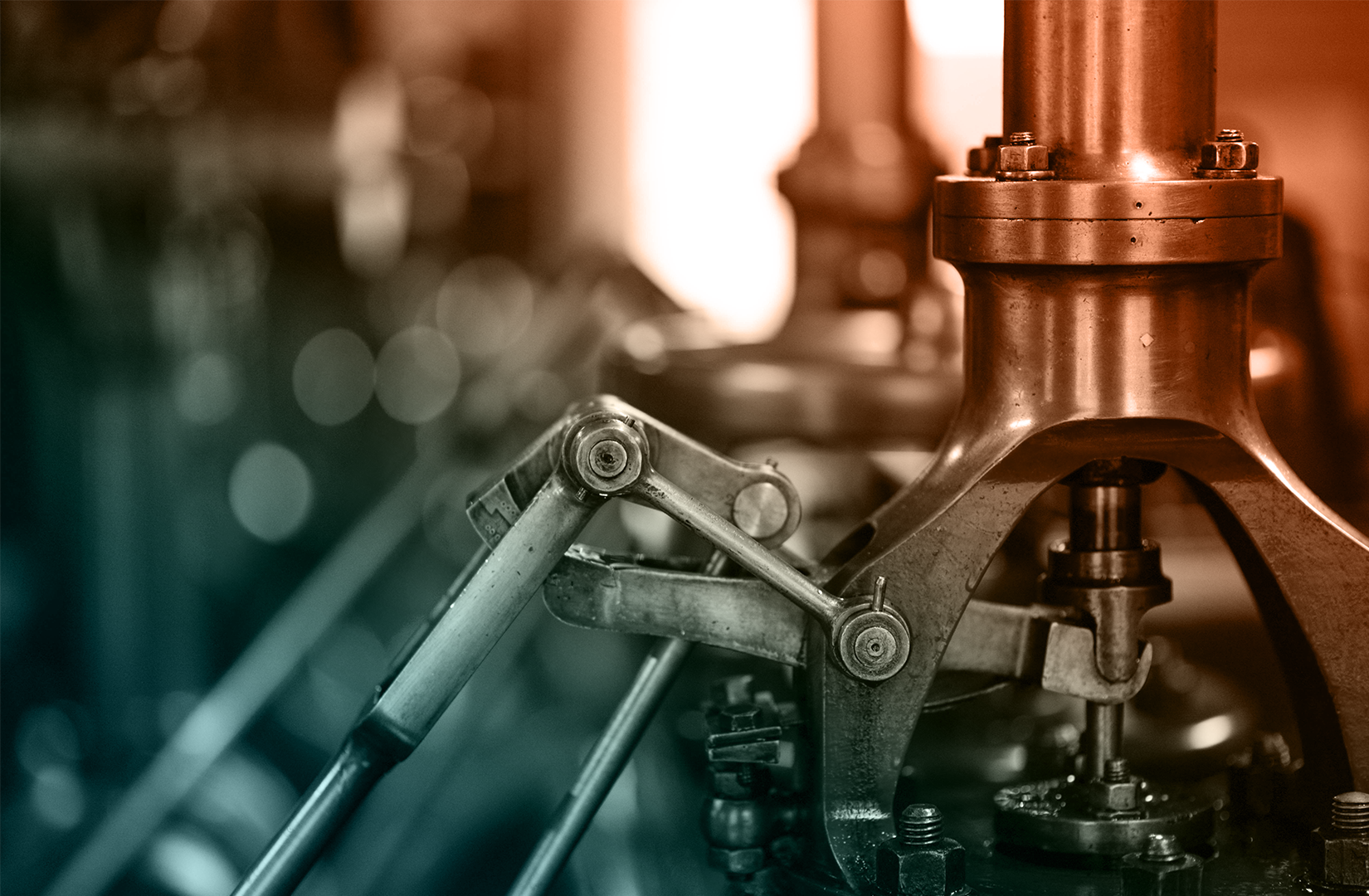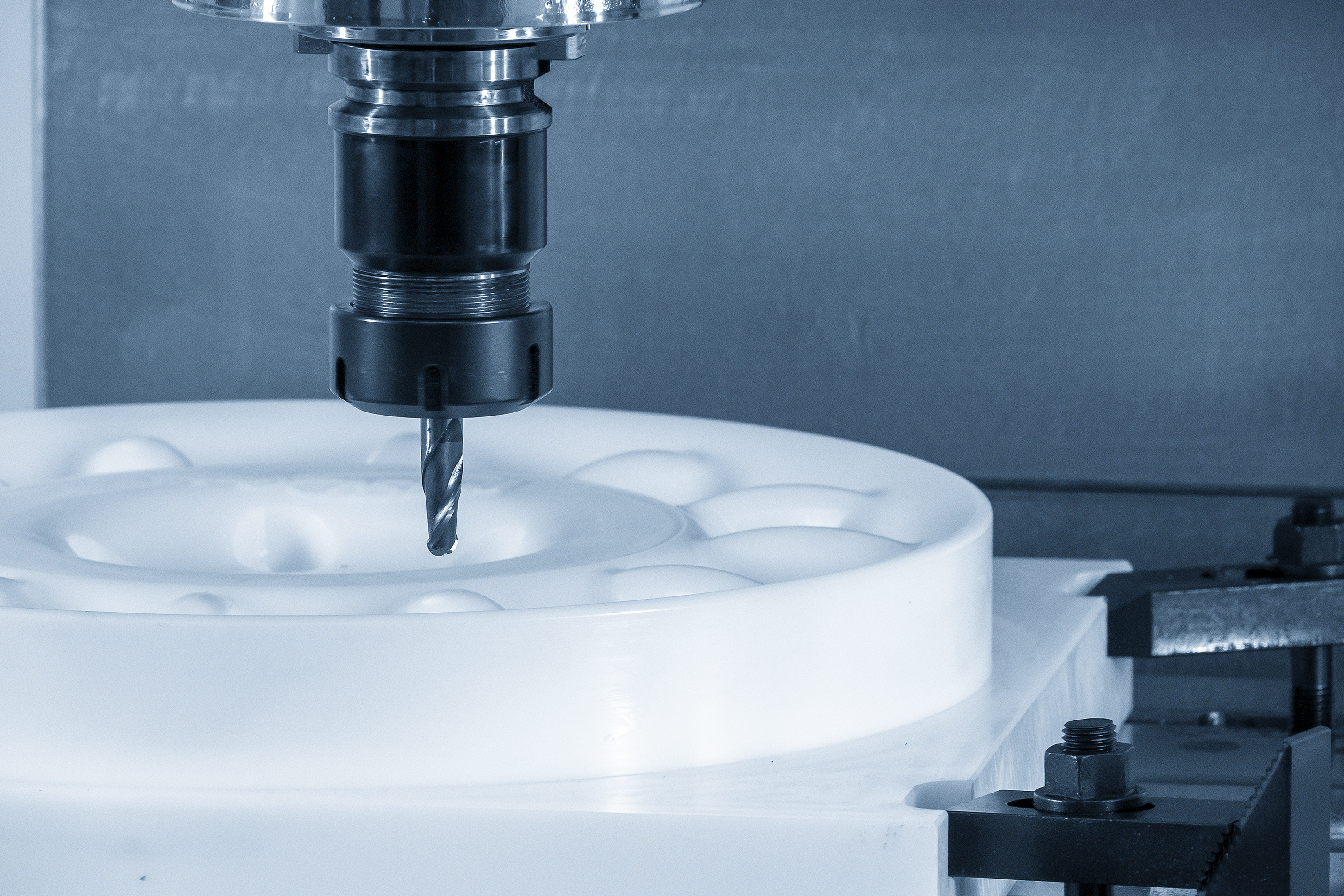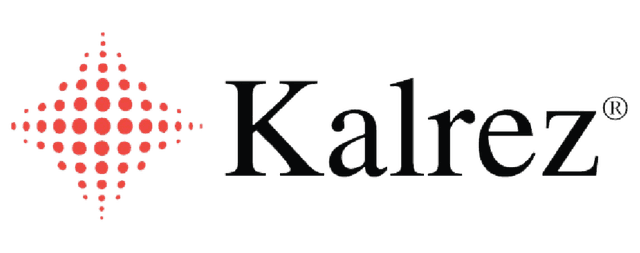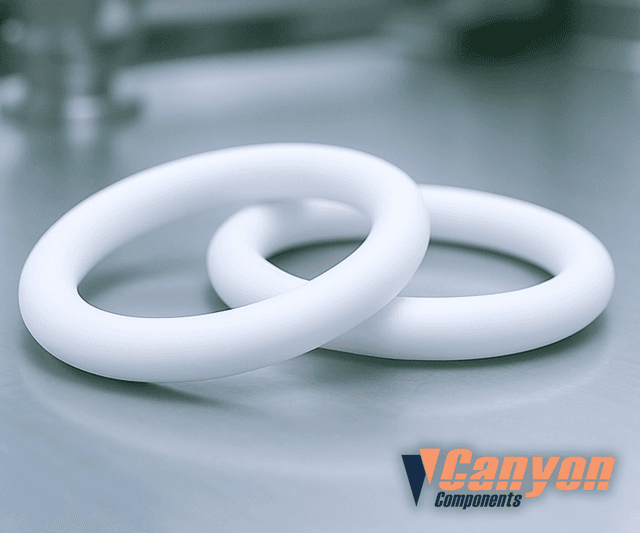
Hammer Union Seals: High-Pressure Applications
Hammer union seals (HUS) are critical components in high-pressure applications, providing reliable sealing solutions in environments where extreme pressure, aggressive chemicals, and abrasive materials are present. Widely used in the oil & gas, chemical processing, and mining industries, these seals are designed to handle the toughest conditions, including resistance to explosive decompression (AED) and varying temperatures. Hammer union seals ensure leak-free connections in hammer unions, making them essential for maintaining safety and operational efficiency in demanding industrial settings.
CanRez® FFKM and Kalrez® hammer union seals, O-rings, gasket rapid manufacturing, & custom molded parts are available now!
Check with one of Canyon’s helpful product engineers for an expert material and manufacturing recommendation.

Features of Hammer Union Seals
Hammer union seals are engineered to meet the rigorous demands of high-pressure applications, offering several key features:
- High-Pressure Resistance: These seals are designed to withstand extreme pressures, often exceeding 10,000 psi, making them ideal for high-pressure environments in oil & gas, chemical processing, and mining operations. The typical high pressure service for hammer union seals ranges from 6,000 psi to 20,000 psi.
- Explosive Decompression (AED) Resistance: Hammer union seals are frequently manufactured from materials that are formulated to resist explosive decompression, ensuring they maintain integrity even when subjected to rapid pressure changes, a common occurrence in high-pressure systems.
- Temperature Stability: Capable of withstanding a wide range of temperatures, hammer union seals maintain flexibility and performance in both high and low-temperature conditions depending on the spec'd in material, making them suitable for use in various industrial environments.
- Chemical Compatibility: These seals are resistant to a broad range of chemicals, acids, and oils, ensuring durability and longevity even in aggressive chemical processing applications.
- Abrasion Resistance: Hammer union seals are designed to resist wear and tear, providing long-lasting performance in abrasive environments such as mining operations.
Common Applications of Hammer Union Seals
Hammer union seals are utilized across several industries where high pressure, chemical resistance, and durability are paramount:
- Oil & Gas Industry: Hammer union seals are widely used in drilling operations, well servicing, and fracking, where they provide reliable sealing for high-pressure fluid transfer systems, including mud pumps, manifolds, and cementing equipment.
- Chemical Processing: In chemical plants, hammer union seals ensure leak-free connections in pipelines and transfer lines, even when exposed to aggressive chemicals and extreme temperatures.
- Mining Industry: Hammer union seals are used in mining operations to handle abrasive slurries and high-pressure fluid transfer, providing reliable sealing in pumps, pipelines, and hydraulic systems.
- Water Injection Systems: In high-pressure water injection systems, hammer union seals prevent leaks and maintain pressure integrity, ensuring efficient operation in oilfield applications.
- Pressure Testing Equipment: Hammer union seals are often used in pressure testing applications, where they provide a reliable seal under high-pressure conditions, ensuring accurate and safe testing results.
Please consult a Canyon Components Engineer about your specific application and we will use our decades of experience to formulate a solution that fits your need.
Get a Quote Now!

Hammer Union Seal Materials
CanRez™ FFKM Perfluoroelastomer
Extreme temperatures & chemicals require extreme solutions! CanRez™ FFKM hammer union seals offer extreme reliability where you need it most! Thousands of sizes in stock now!
Kalrez® FFKM Perfluoroelastomer
Canyon Components offers Kalrez® Perfluoroelastomer (FFKM) hammer union seals, O-rings, gaskets, & custom molded parts at competitive prices and with great lead-times.
Parker® HUS Hammer Union Seals, Parofluor parts, parker FKM Viton
Canyon Components offers Parker Hannifin® HUS hammer union seals, O-rings, Gaskets, Perfluoroelastomer (FFKM) parts, & custom molded parts at competitive prices and with great lead-times.
FKM (Viton®, Fluorocarbon)
FKM HUS hammer union seals, compounds, O-rings, gaskets, & custom molded parts exhibit excellent mechanical attributes as well as excellent resistance to high temperatures, mineral oil, ozone, fuels, hydraulic fluids, and many other solvents and chemicals.
Aflas® (TFE/P)
TFE/P (Aflas) HUS hammer union seals, compounds, O-rings, gaskets, & custom molded parts gives high resistance to steam, hot water, atmospheric wear, and many chemicals. TFE/P compounds provide superior performance in water, steam and virtually all caustic chemicals.
NBR (Nitrile, Buna-N)
Nitrile HUS hammer union seals, O-rings, gaskets, & custom molded parts are very oil-resistant, have strong mechanical properties, are resistant to wear, and are relatively inexpensive. These properties make Nitrile the most commonly used general purpose O-ring, gasket, & custom molded part material.
HNBR (Hydrogenated Nitrile)
Hydrogenated Nitrile HUS hammer union seals, O-rings, gaskets, & custom molded parts offer higher strength and reduced degradation at high temperatures compared to conventional Nitrile materials. These properties make HNBR HUS hammer union seals popular in the oil and gas industry, as well as many applications in the chemical industry.
XNBR (Carboxylated Nitrile)
XNBR HUS hammer union seals, O-rings, gaskets, & custom molded parts are similar to Nitrile, but the backbone has been chemically modified with a Carboxylic Acid group. The resulting elastomer is a Nitrile rubber with outstanding abrasion and chemical resistance, superior to that of traditional Nitrile.
Polyurethane (PU, AU)
Polyurethane HUS hammer union seals, O-rings, gaskets, & custom molded parts generally have two or three times greater tensile strength and wear resistance than Nitrile and comparable polymers. Polyurethane also provides excellent permeation resistance when compared to most rubbers.
PTFE (Teflon)
The harshest environments require specialized solutions. Often times, a Canyon Components PTFE HUS hammer union seals are used in harsh chemical environments. Polytetrafluoroethylene, commonly known as PTFE or Teflon®, is a high-performance fluoropolymer known for its exceptional chemical resistance, low friction, and non-stick properties.
Product Types
Custom Parts
Here at Canyon Components, we make sure to offer our customers any manufacturing technique they desire. Whether your O-rings, gaskets, & custom molded parts be rubber, plastic, or metal, rest assured that Canyon Components can make it!
Gaskets & Custom Cutting
Whether your custom cut parts be rubber, plastic, sponge, composite, or metal, rest assured that Canyon Components can make it! Canyon Components strives to meet all customer service requests. If you need something that isn't listed, feel free to contact a Canyon Components product and application consultant.
Infinite "Giant" Diameter O-Rings
By either Continuous Molding O-rings, or Splice & Vulcanizing O-rings, Canyon can provide mold-less, infinitely large O-rings at competitive prices!
Specialty Compliances
Canyon have materials available for O-rings, gaskets, & custom parts with compliances ranging from USP Class VI <87> & <88> for medical applications, to FDA CFR 21.177.2600 grades A through F for different food types, to the various drinking water specifications like KTW and NSF. Whether it's metal, rubber, or plastic, Canyon can meet your needs!
Details on Materials Used in Hammer Union Seals
Hammer union seals are manufactured from various materials to ensure optimal performance in different environments:
- Nitrile (NBR): Nitrile is a popular choice for hammer union seals due to its excellent oil resistance, abrasion resistance, and ability to handle moderate temperatures. It is suitable for applications involving hydraulic fluids and oils.
- Viton® (FKM): Viton seals offer superior chemical resistance, high-temperature stability, and excellent AED resistance, making them ideal for use in aggressive chemical environments and high-temperature oil & gas applications.
- HNBR (Hydrogenated Nitrile Butadiene Rubber): HNBR provides improved chemical resistance, higher temperature stability, and enhanced resistance to explosive decompression, making it suitable for high-pressure and harsh chemical processing applications.
- PTFE (Polytetrafluoroethylene): PTFE seals offer exceptional chemical resistance, low friction, and the ability to handle extreme temperatures. They are often used in applications where exposure to aggressive chemicals and high pressures is expected.
- EPDM (Ethylene Propylene Diene Monomer): EPDM seals provide excellent resistance to heat, steam, and water, making them suitable for applications where exposure to water or steam is common, although they are less resistant to oils and hydrocarbons.
Canyon Components strives to meet all customer service requests. Feel free to contact Canyon Components engineering and let our knowledgeable staff help you design the perfect part for your needs.
Hammer Union Seals Pros & Cons
Hammer union seals are essential components for high-pressure applications in the oil & gas, chemical processing, and mining industries. Their ability to withstand extreme pressures, resist explosive decompression (AED), and maintain chemical compatibility makes them a reliable choice for demanding environments. With a range of materials available, these seals can be tailored to meet the unique requirements of various industrial applications. Understanding the features, common applications, and material options will help you select the right hammer union seal for your specific needs, ensuring safety, efficiency, and longevity in high-pressure systems.
Canyon Components strives to meet all customer service requests. Feel free to contact Canyon Components engineering and let our knowledgeable staff help you design the perfect part for your needs.
Pros of Hammer Union Seals
Hammer union seals offer several advantages that make them a preferred choice in high-pressure and harsh industrial environments:
- High Pressure and AED Resistance: These seals are specifically designed to handle extreme pressures and resist explosive decompression, ensuring reliable performance in demanding applications.
- Chemical and Abrasion Resistance: Hammer union seals are resistant to a wide range of chemicals, oils, and abrasive materials, providing long-lasting performance even in aggressive environments.
- Temperature Flexibility: With the ability to operate in both high and low temperatures, hammer union seals maintain their sealing integrity in diverse industrial settings.
- Versatility: Available in various materials, hammer union seals can be customized to suit specific applications, ensuring compatibility with different fluids, chemicals, and operating conditions.
- Leak-Free Performance: These seals provide an airtight, leak-free connection, reducing the risk of fluid loss and ensuring the safe operation of high-pressure systems.
Cons of Hammer Union Seals
While hammer union seals offer numerous benefits, there are some potential drawbacks:
- Material Costs: High-performance materials like Viton or HNBR can be more expensive than standard elastomers, increasing the overall cost of hammer union seals.
- Limited Compatibility with Certain Fluids: Some materials, such as EPDM, may not be compatible with specific oils or hydrocarbons, limiting their use in certain applications.
- Maintenance Requirements: In high-abrasion environments, hammer union seals may require regular inspection and maintenance to ensure they continue to provide an effective seal.
Back to Products Hub

Get A Quote Now!













